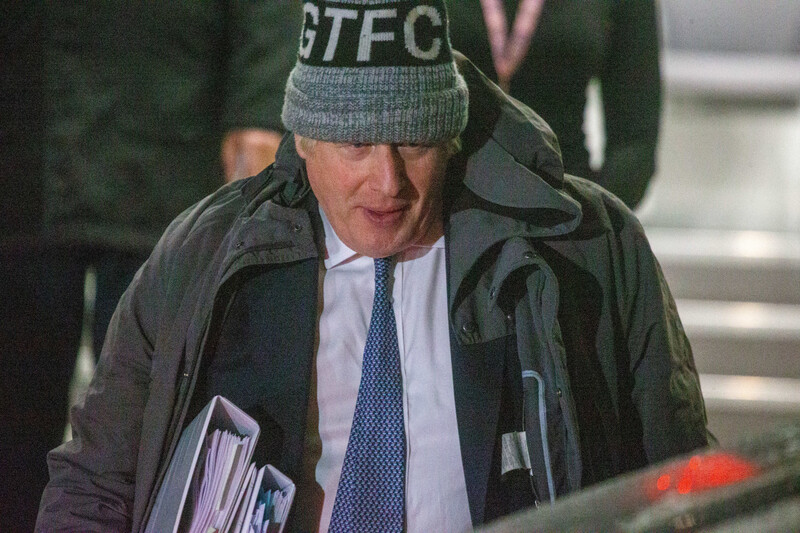Power Suits 9 January 2024

Former British PM Boris Johnson has criticized British police for an ongoing investigation into Israeli war crimes.
ZUMAPRESSWith the British Parliament set to vote on the government’s so-called anti-boycott bill, and the Home Office deliberating whether pro-Palestine activists should pay the cost of policing demonstrations, a concerted effort to narrow the space for those who would hold Israel accountable for its genocidal violence in occupied Palestine appears to be gaining momentum.
Last week, a leading British attorney and a former UK prime minister also criticized British police for an ongoing investigation into war crimes in Palestine.
Simon Myerson – the lawyer in question – echoed remarks made by former PM Boris “The Truth” Johnson, who suggested that UK police would be “better off fighting knife crime” in London.
Myerson called war crimes investigations by the British police – investigations the police are treaty bound to pursue under the terms of the 1998 Rome Statute that established the International Criminal Court and to which the UK is a signatory – “virtue signaling.”
“At the moment, if one complains about a fraud or a bicycle being stolen, it’s extremely unlikely to be investigated, and I wonder whether this is a good use of police resources. It seems closer to virtue signaling than actual action,” Myerson said, according to the London Times.
Ah yes, who cares about genocide? Where’s my bike?
Myerson, incidentally, also chairs the Leeds Jewish Representative Council, which counts as one of its sponsors the Community Security Trust (CST).
Nominally tasked with monitoring and combating anti-Jewish bigotry, the CST has ben the subject of complaints that it is “abusing its mandate” to support Israel and protect it from criticism.
That Boris Johnson should object to any formal investigation into Israeli war crimes is par for his crooked course: As prime minister in 2021, Johnson made clear his opposition to an ICC investigation into Israel’s conduct in the 2014 attack on Gaza that killed more than 1,450 civilians.
After all, he reasoned in a letter to the Conservative Friends of Israel, such an investigation “gives the impression of being a partial and prejudicial attack on a friend and ally of the UK’s.”
Lord forbid.
Protests for the rich
Hot on the heels of those comments, Britain’s Home Office said it is assessing proposals from an “independent” government adviser on “political violence and disruption” that pro-Palestine demonstrators should bear the cost of policing the mass protests that have been a constant feature up and down the UK since 7 October.
Framing the demonstrations as “anti-Israel,” as reported by The Telegraph newspaper, the review, authored by Lord Walney, a former Labour MP, argued that, “when groups run so many mass protests, the authorities should consider whether organizers should be asked to contribute to policing costs.”
Lord Walney, incidentally, when he was plain old John Woodcock MP, was chair of the Labour Friends of Israel group, in which capacity he described Israel as a “great nation which is rooted in the progressive liberal values we all hold dear.”Nothing, of course, says “progressive liberal values” more than ethnic cleansing.
The review comes as MPs prepare to vote on Wednesday in the third and final reading of the inconveniently named Economic Activity of Public Bodies (Overseas Matters) Bill, more commonly referred to as the anti-boycott bill.
The proposed legislation would curtail the ability of public bodies “from being influenced by political or moral disapproval of foreign states” when making procurement and investment decision, and specifically singles out attempts to boycott Israel.
The bill is in its final reading in the House of Commons, Britain’s lower house, before it passes to the House of Lords, Britain’s unelected upper house.
The House of Lords can only delay the bill, but cannot force the House of Commons to ditch it.
The bill’s passage through Parliament has so far been sanguine, despite warnings from British civil society organizations and Palestine activists that it is profoundly anti-democratic and directly aimed at the boycott, divestment and sanctions (BDS) movement.
There is no suggestion that Wednesday’s vote will not be in favor of the government’s legislation. The UK’s main opposition party, the Labour Party and its leader Keir Starmer have towed the government line on Palestine, refusing to call for an immediate and permanent ceasefire in Gaza despite Israel’s stated genocidal intent.
The vote will come a day before the International Court of Justice is set to hear a South African application under the Genocide Convention accusing Israel of committing genocide in Gaza.Should the application be accepted, the ICJ could issue a temporary injunction on Israel to immediately cease fire in Gaza, an injunction that the UK would be treaty bound to honor.
That should be appropriately embarrassing for Rishi “Loadsamoney” Sunak, the UK’s second unelected prime minister since Boris Johnson, who will have to choose between his fealty to Washington and Tel Aviv and an order from the world’s highest judicial body.
As for Sir Keir Starmer, AKA Mr. Human Rights, such a ruling might help him locate his missing moral compass. Or maybe just a single standard.





Comments
Also this week the British
Permalink Ali replied on
Also this week the British Government seeks to ban a non-violent Islamic political party (Hizb-ut-Tahrir) on trumped up charges of anti-semitism and glorifying terrorism.